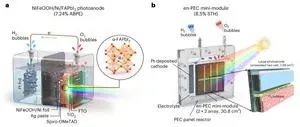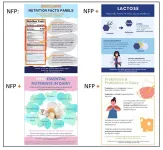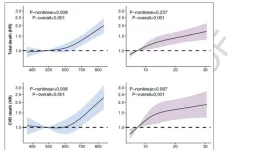(Press-News.org) An international team of scientists led by ICREA researcher and Director of the Life Sciences Department at the Barcelona Supercomputing Centre - Centro Nacional de Supercomputación (BSC-CNS), Alfonso Valencia, has developed a technology based on artificial intelligence (AI) for the study of minority diseases and has successfully applied it to identify the possible causes of the appearance of what are known as myasthenic-congenital syndromes, a group of rare inherited disorders that limit the ability to move and cause varying degrees of muscle weakness in patients.
The lack of available data on minority, also known as rare, diseases makes research in this area extremely difficult. This work marks a major milestone in the application of AI-based methods, namely multi-layer networks that link and interrelate information from different databases, to address unresolved questions in the study of rare diseases, which affect between 5% and 7% of the population. The study, published today in the prestigious journal Nature Communications, took more than 10 years to complete and involved researchers from 20 scientific institutions in Spain, Canada, Japan, the UK, the Netherlands, Bulgaria and Germany.
"Rare diseases remain an unexplored challenge for biomedical research. The most advanced AI technologies are currently designed to analyse large volumes of data and are not trained for scenarios where the availability of patient data is limited, a key characteristic of rare diseases. This requires large and very long collaborative efforts such as the one we present today," explains BSC researcher Iker Núñez-Carpintero, a member of the BSC's Machine Learning for Biomedical Research Unit, led by Davide Cirillo, and the Computational Biology Group, led by Valencia, both co-authors of the study.
In the study, which involved a cohort of 20 patients from a small population in Bulgaria, the researchers developed a method that uses AI techniques to overcome the limited data available to understand why patients with the same disease and the same mutations suffer very different degrees of severity. The method uses information from large biomedical databases on all kinds of biological processes to explore the relationships between genes in each patient. "The aim is to identify some kind of functional relationship that can help us to find the missing pieces of the disease puzzle that we haven't seen because there are not enough patients," says Núñez-Carpintero.
The role of supercomputing and AI
The development of AI methods based on multi-layer networks and the latest advances in supercomputing have made it possible to find the missing pieces to which the BSC researcher refers, as they allow much faster analysis of large biomedical data than was possible a decade ago, when the study began. This allows researchers to find information that links patients with rare diseases, helping to understand their symptoms and clinical manifestations.
"Recent advances in supercomputing infrastructures, such as the new MareNostrum 5 recently inaugurated at the BSC, represent a tremendous opportunity to develop new strategies for rare disease research. Research into these diseases requires the simultaneous analysis of individual patient data and the general biomedical knowledge accumulated over the last decade. This task demands a strong computational infrastructure, which is only now becoming a reality," adds Núñez-Carpintero.
The importance of the research lies in the fact that it opens new avenues for the development of computational applications specifically designed for rare diseases. It also represents a breakthrough in the use of multilayer networks to address fundamental questions about the nature of these diseases. In this case, the results show how different levels of severity of myasthenic congenital syndromes are linked to specific mutations in the correct process of muscle contraction.
The value of drug repositioning in rare diseases
In addition, this study is the first to allow us to understand the possible genetic causes behind the beneficial effects of certain treatments that are effective in some patients with this disease, such as salbutamol, which is commonly used to treat respiratory problems such as asthma. This will allow the development of new drug repositioning strategies, which are essential in the case of rare diseases due to the difficulty of developing specific treatments and the lack of interest from the pharmaceutical industry.
"This is the first study that can genetically explain why some patients with this rare disease respond well to treatments such as salbutamol. This discovery highlights the importance of drug repositioning, a field currently being pursued in biomedical research, and opens up new possibilities for understanding and treating rare diseases using precision medicine methods," concludes Núñez-Carpintero.
Reference: Núñez-Carpintero, I., Rigau, M., Bosio, M. et al. Rare disease research workflow using multilayer networks elucidates the molecular determinants of severity in Congenital Myasthenic Syndromes. Nat Commun 15, 1227 (2024). https://doi.org/10.1038/s41467-024-45099-0
END
International team led by BSC develops artificial intelligence technology to improve treatment of rare diseases
The research, published in Nature Communications, is the culmination of more than 10 years of collaboration between scientists from 20 different institutions in Spain, Canada, Japan, the UK, the Netherlands, Bulgaria and Germany.
2024-02-28
ELSE PRESS RELEASES FROM THIS DATE:
Anti-cancer drug could improve symptoms after stroke
2024-02-28
A study by the Institut de Neurociències of the UAB (INc-UAB) demonstrates in animal models the benefits of vorinostat after having suffered a stroke. The drug, used in humans to treat cutaneous T-cell lymphoma, has been proved to mitigate brain injuries and help in restoring brain tissue.
Ischemic stroke is the second leading cause of death worldwide and occurs when blood flow cannot reach the brain due to an obstruction. For a more or less long period of time, the brain does not receive oxygen and this causes damage and functional impairment. Hypertension is the most frequent modifiable risk factor for stroke and is associated with worse recoveries.
Currently, ...
Consumers empowered with the facts on dairy’s nutritional benefits buy and consume more dairy foods
2024-02-28
Philadelphia, February 28, 2024 – Although most Americans consume dairy and many dairy foods are rising in popularity, fluid milk consumption has seen a significant decline among US consumers since the 1960s. To reverse this trend—and ensure consumers are getting adequate amounts of dairy in their diets—the dairy sector has developed educational materials to reach consumers through informational infographics and TV and print ads, and on social media. But do these kinds of educational ...
How air pollution can harm team performance
2024-02-28
High levels of air pollution can harm performance of teams, which are vital for solving complex problems such as developing clean energy technologies and vaccines, and this could harm economic development in highly polluted emerging economies, says a new study co-authored at Cambridge Judge Business School.
The study used data from 15,000 live escape-room games in London. It estimated based on the data and the study’s equations that for about 3,500 teams that participated for team-building exercises (usually from a corporate ...
Online toxicity can only be countered by humans and machines working together, according to Concordia researchers
2024-02-28
Wading through the staggering amount of social media content being produced every second to find the nastiest bits is no task for humans alone.
Even with the newest deep-learning tools at their disposal, the employees who identify and review problematic posts can be overwhelmed and often traumatized by what they encounter every day. Gig-working annotators, who analyze and label data to help improve machine learning, can be paid pennies per unit worked.
In a new Concordia-led paper published in IEEE Technology and Society Magazine, researchers argue that supporting ...
SwRI sponsors Future Leaders Program at 2024 ITS America Conference & Expo
2024-02-28
SAN ANTONIO– February 28, 2024 – Southwest Research Institute (SwRI) and ITS Arizona are inviting college students to participate in the Future Leaders Program at this year’s ITS America Conference & Expo, April 22-25, at the Phoenix Convention Center.
The Future Leaders Program allows the next generation of intelligent transportation systems (ITS) leaders to attend education sessions and meet with exhibitors, sponsors and technology providers, all while networking with ITS professionals who can offer career advice and mentorship.
“The ITS industry is continuously looking for smart and creative people to ...
New LOINC® semiannual release highlights health equity work with national and international partners
2024-02-28
LOINC® from Regenstrief Institute’s semiannual content update highlights the comprehensive nature of its work with international partners, including supporting interoperability for prescription drug records, reporting notifiable conditions and standardizing social risk screening tools to represent social determinants of health (SDOH) information in electronic health records (EHRs).
LOINC release 2.77 includes more than 800 new concepts and edits to more than 1,500 concepts. Work captured in the new release includes support for molecular genetic drug and toxicology ...
New study unveils scalable and efficient photoelectrode modules for green hydrogen production
2024-02-28
In a groundbreaking development towards practical photoelectrochemical water splitting, a research team in the School of Energy and Chemical Engineering at UNIST, led by Professors Jae Sung Lee, Ji-Wook Jang, and Sang Il Seok, in collaboration with Professor Hankwon Lim from the Graduate School of Carbon Neutrality at UNIST, has achieved a remarkable technological breakthrough in the production of green hydrogen. Through their innovative approach, the team has overcome the challenges of efficiency, stability, and scalability in photoelectrodes, paving the way for ...
Sedentary behavior increases mortality risk
2024-02-28
Based on decades-long observations of centenarians, author Dan Buettner (Blue Zones) conjectures that people live longer when they get up and move around after sitting for twenty minutes. Now, a rigorous new study published in the Journal of the American Heart Association (JAHA) has data showing that older women who sat for 11.7 hours or more per day increased their risk of death by 30 percent, regardless of whether they exercised vigorously.
Study co-author Steve Nguyen, Ph.D., M.P.H., a postdoctoral fellow at the University of California San Diego Herbert Wertheim School of Public Health and Human Longevity Science, ...
New approach may prevent deadly intestinal disease in preemies
2024-02-28
Scientists from Stanley Manne Children’s Research Institute at Ann & Robert H. Lurie Children’s Hospital of Chicago and colleagues found that an investigational protein replacement – recombinant human insulin-like growth factor 1 and its binding protein-3 (rhIGF-1/BP3) – protected neonatal mice from necrotizing enterocolitis (NEC), a deadly intestinal disease that often strikes extremely premature infants. Results were published in the journal Pediatric Research.
“Our preclinical evidence is encouraging and paves the way to a clinical trial of rhIGF-1/BP3 for prevention of NEC,” said senior author Isabelle De Plaen, MD, a scientist ...
Endocrine Society supports federal legislation protecting IVF access
2024-02-28
WASHINGTON—The Endocrine Society is calling for members of Congress to support federal legislation protecting access to in vitro fertilization (IVF).
The Access to Family Building Act (S.3612/H.R.7056), proposed by Sens. Tammy Duckworth (D-IL), Patty Murray (D-WA), and Rep. Susan Wild (D-PA), would ensure people can access safe, effective IVF and other assisted reproductive technologies to start or grow their families.
Families’ access to IVF services is being threatened by an Alabama State Supreme Court ruling that frozen embryos ...
LAST 30 PRESS RELEASES:
Scientists discover why we know when to stop scratching an itch
A hidden reason inner ear cells die – and what it means for preventing hearing loss
Researchers discover how tuberculosis bacteria use a “stealth” mechanism to evade the immune system
New microscopy technique lets scientists see cells in unprecedented detail and color
Sometimes less is more: Scientists rethink how to pack medicine into tiny delivery capsules
Scientists build low-cost microscope to study living cells in zero gravity
The Biophysical Journal names Denis V. Titov the 2025 Paper of the Year-Early Career Investigator awardee
Scientists show how your body senses cold—and why menthol feels cool
Scientists deliver new molecule for getting DNA into cells
Study reveals insights about brain regions linked to OCD, informing potential treatments
Does ocean saltiness influence El Niño?
2026 Young Investigators: ONR celebrates new talent tackling warfighter challenges
Genetics help explain who gets the ‘telltale tingle’ from music, art and literature
Many Americans misunderstand medical aid in dying laws
Researchers publish landmark infectious disease study in ‘Science’
New NSF award supports innovative role-playing game approach to strengthening research security in academia
Kumar named to ACMA Emerging Leaders Program for 2026
AI language models could transform aquatic environmental risk assessment
New isotope tools reveal hidden pathways reshaping the global nitrogen cycle
Study reveals how antibiotic structure controls removal from water using biochar
Why chronic pain lasts longer in women: Immune cells offer clues
Toxic exposure creates epigenetic disease risk over 20 generations
More time spent on social media linked to steroid use intentions among boys and men
New study suggests a “kick it while it’s down” approach to cancer treatment could improve cure rates
Milken Institute, Ann Theodore Foundation launch new grant to support clinical trial for potential sarcoidosis treatment
New strategies boost effectiveness of CAR-NK therapy against cancer
Study: Adolescent cannabis use linked to doubling risk of psychotic and bipolar disorders
Invisible harms: drug-related deaths spike after hurricanes and tropical storms
Adolescent cannabis use and risk of psychotic, bipolar, depressive, and anxiety disorders
Anxiety, depression, and care barriers in adults with intellectual and developmental disabilities
[Press-News.org] International team led by BSC develops artificial intelligence technology to improve treatment of rare diseasesThe research, published in Nature Communications, is the culmination of more than 10 years of collaboration between scientists from 20 different institutions in Spain, Canada, Japan, the UK, the Netherlands, Bulgaria and Germany.






